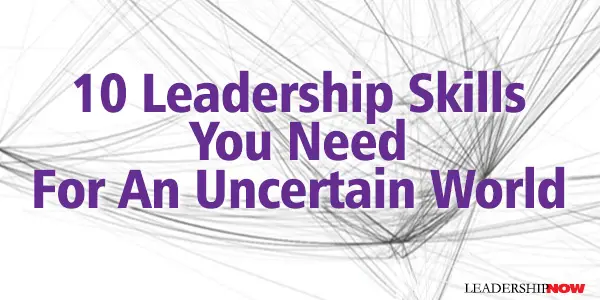 |
 |
05.06.09

Ten Leadership Skills You Need For An Uncertain World
UNCERTAINTY is a part of life. Uncertainty is a call for leadership. Creating clarity from uncertainty is a leader’s stock in trade. Unquestionably some periods of time are more demanding than others. Times like these call on leaders to take a broader view of who and why they are leading and the impact they are having on the world around them. While this is very demanding for any leader, it is also more meaningful. In Leaders Make the Future, futurist Bob Johansen reports that volatility, uncertainty, complexity and ambiguity will only get worse in the future. “Solvable problems will still abound, but top leaders will deal mostly with dilemmas which have no solutions, yet leaders will have to make decisions anyway.” Johansen emphasizes ten leadership skills that will help leaders to cope and thrive in the volatile decade ahead. “We need not passively accept the future. Leaders can and must make a better future.” Although it’s “hard to even think about the future if you are overwhelmed by the present … looking to distant possibilities can provide new insight for the present.” The ten skills he lays out move from the instinctual to the complex and build on each other. Here is a summary of Johansen’s work for you to think on:1. Maker Instinct: The ability to exploit your inner drive to build and grow things, as well as connect with others in the making. Future leaders will need both a can-do and a can-make spirit. The maker instinct is what separates the leaders from the powerless. 2. Clarity: The ability to see through messes and contradictions to a future that others cannot see. Leaders are very clear about what they are making, but very flexible about how it gets made. How can you as a leader, create and communicate with clarity in confusing times – without being simplistic? 3. Dilemma Flipping: The ability to turn dilemmas – which, unlike problems, cannot be solved – into advantages and opportunities. We must be able to nurture the ability to engage with hopelessness, learn how to wade through it to the other side, and flip it in a more positive direction. Think Roger Martin’s concept of the “opposable mind.” How can you remake a situation with no solution? 4. Immersive Learning Ability: The ability to immerse yourself in unfamiliar environments; to learn from them in a first-person way. Immersive learning requires active attention, the ability to listen and filter, and to see patterns while staying centered – even when overwhelmed with stimuli. Leaders can’t absorb everything, so they must filter out extraneous information and learn how to recognize patterns as they are emerging. 5. Bio-Empathy: The ability to see things from nature’s point of view; to understand, respect, and learn from nature’s patterns. It is big-picture thinking that respects all the multiple interrelated parts and nonlinear relationships, as well as cycles of change. 6. Constructive Depolarizing: The ability to calm tense situations where differences dominate and communication has broken down – and bring people from divergent cultures toward constructive engagement. The next decade will be characterized by diversity and polarization. The temptation is to pick sides, but that is rarely a good strategy. 7. Quiet Transparency: The ability to be open and authentic about what matters to you – without advertising yourself. This begins with humility. Leaders who advertise themselves and take credit for their own performances will become targets. Are you self-promoting? 8. Rapid Prototyping: The ability to create quick early versions of innovations, with the expectation that later success will require early failures. Fail early, fail often, and fail cheaply. Accept failures as important ingredients to success and learn from them. 9. Smart Mob Organizing: The ability to create, engage with, and nurture purposeful business or social change networks through intelligent use of electronic and other media. Leaders are what they can organize. Can you organize smart mobs using a range of media? 10. Commons Creating: The ability to seed, nurture, and grow shared assets that can benefit other players – and sometimes allow competition at a higher level. Can you create commons within which both cooperation and competition may occur? 
Posted by Michael McKinney at 09:30 AM
|
BUILD YOUR KNOWLEDGE
 

How to Do Your Start-Up Right STRAIGHT TALK FOR START-UPS 
Grow Your Leadership Skills NEW AND UPCOMING LEADERSHIP BOOKS 
Leadership Minute BITE-SIZE CONCEPTS YOU CAN CHEW ON 
Classic Leadership Books BOOKS TO READ BEFORE YOU LEAD |